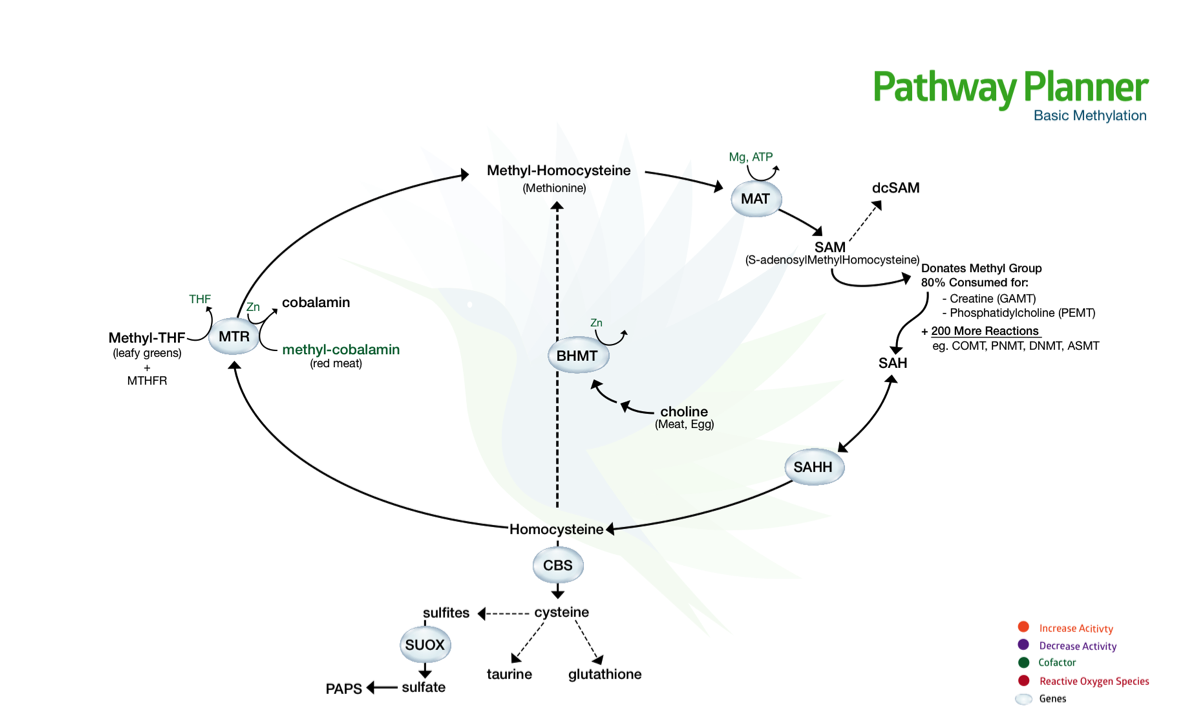Methylation Analysis
The process of Methylation, and its related topics such as MTHFR and Folate are becoming more popular as we learn about this ubiquitous process.

But what is Methylation, and why do I care?
Methylation is the second most common process that occurs in the human body (the most active process is that of creating ATP - our cellular energy currency). Thus, it is a core process that touches many different body systems.
In its most basic sense, methylation is the process of moving a methyl group (C-H3) from here to there (think of it as a tag or a switch). In doing so, this causes an effect or a change.
So for example, methylating your estrogen (using an enzyme COMT - the “MT” meaning “methyl transferase”) will cause that form of estrogen (OHE1) to become far less toxic as it is being metabolized to MeE1 - conversely, NOT methylating the estrogen (OHE1) properly will cause a buildup of that form of estrogen (OHE1) that can damage DNA and lead to cancer. THIS is why we FOCUS on minimizing risk when treating our patients with hormone replacement (sadly this is rarely done by most hormone treatment practices) using such practices as monitoring the metabolism of estrogen (ie with DUTCH Hormone testing) AND understanding how to respond to the lab data as it is received.
Generally speaking, methylation physiologically is responsible for turning genes on or off, repair of DNA, keeping inflammation in check, detoxification, neurotransmitter balance and associated mood issues, synthesis and metabolism of neurotransmitters such as serotonin, dopamine, norepinephrine, and epinephrine, supporting myelin (the protective coating along nerves, and forming creatine (for energy reserve in muscle and brain).
Well - if you are under-methylating OR over-methylating, you will have serious issues either short term, long term, or both. These issues can include cancer, chronic disease, mood disorders, general states of energy and fatigue, insomnia, and others. You can also see increased miscarriage rate and infertility.
And just to make things more complicated, there are certainly other issues that can contribute to most or all of the symptoms and problems associated with methylation issues, including gut issues such as SIBO, leaky gut and the associated immune activation, micronutrient deficiencies, toxin influences, hormone imbalance, inappropriate supplementation initiating unwanted feedback regulation, and more.
So - how do we approach this whole issue? Well - as usual, it is important to consider the entire patient.
Evaluation of the nutritional status, the gut status, toxin and intercurrent infections, and sleep/anxiety management all are important aspects affecting disturbed physiology as well as methylation. We always start from the bottom up - maximizing nutrition, toxin minimization, assessing imbalances and epigenetic influences (paying attention to the "5 boxes").
FoundationMED will also begin with an evaluation of multiple genes associated with methylation. These will include MTHFR, COMT, VDRTaq, CBS, PEMT, NOS3, BCO1 and many others. From this information, an initial therapeutic approach can be initiated.
Further information from the expression of the methylation cycle (i.e. the products of those methylation genes) can help better understand where the methylation cycle is impaired (ie via the Plasma Methylation Profile blood test and others).
We are currently becoming certified in OPUS 23 genetic analysis - this will allow an incredibly deep dive into complex genetic analysis, risk and support analysis, and response to specific gene mutations and combinations - currently FoundationMED is unique in offering this analysis in North Carolina!
It must be understood that one should never treat based on genetic information alone. We ALWAYS need to consider the entire SYSTEM rather than treat based on single SNPS (or mutations). We use tools (such as OPUS 23) to allow us to do just that!
Often you will see treatment recommendations from well meaning but uninformed practitioners or internet information providers listing gene (SNP) after gene - each with a specific recommendation. This is not how it works and is a fruitless exercise. I wish it was so easy!
There are other important factors affecting methylation, certainly including diet, toxin exposure (processed foods, pesticides, plastics, phthalates and others), stress and lack of sleep, inflammation, nutrients (including impairment to nutrient absorption as seen with SIBO, low stomach acid, leaky gut), magnesium, molybdenum, sulfites, and other methylation cofactors have to taken into account.
As you can see, the methylation system is a complex yet very fundamental system that impacts on many areas of human health and well-being. As we learn more about methylation we become better equipped to both evaluate and treat methylation issues.
So for example, methylating your estrogen (using an enzyme COMT - the “MT” meaning “methyl transferase”) will cause that form of estrogen (OHE1) to become far less toxic as it is being metabolized to MeE1 - conversely, NOT methylating the estrogen (OHE1) properly will cause a buildup of that form of estrogen (OHE1) that can damage DNA and lead to cancer. THIS is why we FOCUS on minimizing risk when treating our patients with hormone replacement (sadly this is rarely done by most hormone treatment practices) using such practices as monitoring the metabolism of estrogen (ie with DUTCH Hormone testing) AND understanding how to respond to the lab data as it is received.
Generally speaking, methylation physiologically is responsible for turning genes on or off, repair of DNA, keeping inflammation in check, detoxification, neurotransmitter balance and associated mood issues, synthesis and metabolism of neurotransmitters such as serotonin, dopamine, norepinephrine, and epinephrine, supporting myelin (the protective coating along nerves, and forming creatine (for energy reserve in muscle and brain).
But what does this all mean?
Well - if you are under-methylating OR over-methylating, you will have serious issues either short term, long term, or both. These issues can include cancer, chronic disease, mood disorders, general states of energy and fatigue, insomnia, and others. You can also see increased miscarriage rate and infertility.
And just to make things more complicated, there are certainly other issues that can contribute to most or all of the symptoms and problems associated with methylation issues, including gut issues such as SIBO, leaky gut and the associated immune activation, micronutrient deficiencies, toxin influences, hormone imbalance, inappropriate supplementation initiating unwanted feedback regulation, and more.
So - how do we approach this whole issue? Well - as usual, it is important to consider the entire patient.
Evaluation of the nutritional status, the gut status, toxin and intercurrent infections, and sleep/anxiety management all are important aspects affecting disturbed physiology as well as methylation. We always start from the bottom up - maximizing nutrition, toxin minimization, assessing imbalances and epigenetic influences (paying attention to the "5 boxes").
FoundationMED will also begin with an evaluation of multiple genes associated with methylation. These will include MTHFR, COMT, VDRTaq, CBS, PEMT, NOS3, BCO1 and many others. From this information, an initial therapeutic approach can be initiated.
Further information from the expression of the methylation cycle (i.e. the products of those methylation genes) can help better understand where the methylation cycle is impaired (ie via the Plasma Methylation Profile blood test and others).
We are currently becoming certified in OPUS 23 genetic analysis - this will allow an incredibly deep dive into complex genetic analysis, risk and support analysis, and response to specific gene mutations and combinations - currently FoundationMED is unique in offering this analysis in North Carolina!
It must be understood that one should never treat based on genetic information alone. We ALWAYS need to consider the entire SYSTEM rather than treat based on single SNPS (or mutations). We use tools (such as OPUS 23) to allow us to do just that!
Often you will see treatment recommendations from well meaning but uninformed practitioners or internet information providers listing gene (SNP) after gene - each with a specific recommendation. This is not how it works and is a fruitless exercise. I wish it was so easy!
There are other important factors affecting methylation, certainly including diet, toxin exposure (processed foods, pesticides, plastics, phthalates and others), stress and lack of sleep, inflammation, nutrients (including impairment to nutrient absorption as seen with SIBO, low stomach acid, leaky gut), magnesium, molybdenum, sulfites, and other methylation cofactors have to taken into account.
As you can see, the methylation system is a complex yet very fundamental system that impacts on many areas of human health and well-being. As we learn more about methylation we become better equipped to both evaluate and treat methylation issues.

Dr. Lynch's website (DrBenLynch.com) currently lists Dr. Citron as a Referral physican for methylation issues.
Dr. Lynch is a known leader in methylation education and recently published the book "Dirty Genes" that I recommend.
Learning and implementing the pathway planners, utilizing data derived from SNP analysis and StrateGene reports, and collegial interactions all work to help better understand and incorporate this incredibly useful information with the goal of improving patient care and outcomes.